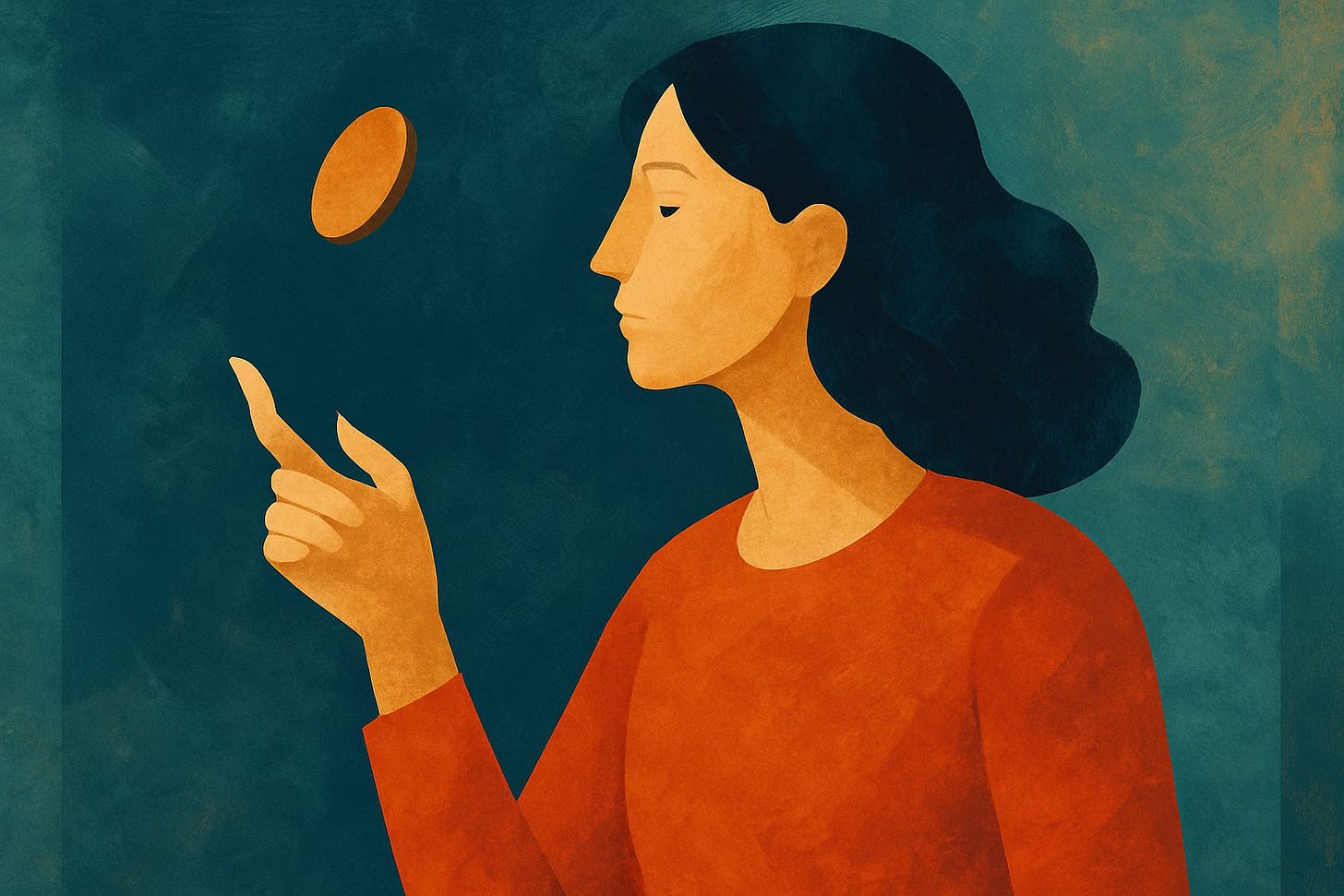Breaking the All-or-Nothing Pattern
A Story about how one mom started flipping fewer coins...and taught her daughter she didn’t need to earn love
By the time Elena noticed the coin, she’d already passed it down.
It had lived in her pocket for years. Not for luck.
Not for spending.
But as a silent scorecard.
One side read: Good Enough.
The other: You Blew It.
She didn’t mean to flip it.
But it flipped anyway.
Morning
She was already behind.
Lila’s socks didn’t match. The lunchbox was still in the sink.
The noise of the morning was too loud for her brain to sequence anything in order.
One forgotten step made five more fall apart.
Elena had ADHD, though she rarely said it out loud.
It felt like an excuse.
It felt like failure with a label.
When the milk spilled and her toddler cried, she snapped.
Not loudly. Just enough to break the room.
Flip.
Tails.
Another bad mom moment.
What she didn’t see:
Lila later that morning, lining her toys into “good” and “bad” piles.
The stuffed rabbit didn’t get breakfast.
Midday
At work, Elena stared at her screen while a coworker reworded her idea and pitched it as his own.
She couldn’t find her voice fast enough to interrupt.
By the time she did, the moment was already gone.
Her executive function worked like a loading screen: laggy, unreliable, always a few seconds too late.
Then came the shame spiral:
“You always freeze. You never speak up. You let them walk all over you.”
Flip.
Tails.
You’re either confident or invisible.
What she didn’t see:
Maya watching from another Zoom box, thinking,
“She’s so thoughtful. I wish she’d take up more space. People would listen.”
But Maya didn’t say it.
And Elena muted herself.
Evening
Dinner was frozen pizza again.
The permission slip was still on the fridge.
The dishwasher beeped because she forgot to press start last night.
Her husband asked, “Are you okay?”
She said, “I’m fine,”
but it came out flat.
Inside, she was managing fifty open tabs in her brain.
And not one of them had finished loading.
He rinsed the plates.
Not with anger, just resignation.
He’d seen her fight herself all day.
He just didn’t know how to reach her through the noise.
Flip.
Tails.
You’re either grateful or failing. And tonight, you failed.
Bedtime
She tucked Lila in under her favorite blanket.
“Was I good today?” Lila asked.
Elena blinked.
That question hit her like a mirror.
Not because Lila had done anything wrong,
but because that question was hers.
She’d been asking it in different forms all day.
To her daughter.
To her coworkers.
To herself.
“You’re good just by being you,” she said softly.
And meant it.
Mostly.
Later That Night
She sat on the hallway floor, knees pulled tight to her chest.
No tears. Just the hum of mental exhaustion.
The kind of fatigue that isn’t about being tired,
but about constantly trying to compensate for a brain that won’t cooperate.
She reached into her pocket.
The coin was still there.
The flips no one else saw.
The rules she never agreed to follow.
You’re too much.
You’re not enough.
You should have remembered.
You should’ve known better.
She thought about Maya.
About her husband’s tired face.
About Lila’s lined-up toys.
This wasn’t just her personal chaos.
It was shaping the atmosphere they all lived in.
The Shift
She didn’t make a big vow.
She was done setting herself up with goals she couldn’t track, lists she couldn’t finish, promises she couldn’t keep.
But she did decide to try one thing:
To speak the truth out loud. Even the messy parts.
To name the moments when the coin flipped.
To interrupt the script.
To remind her daughter that love doesn’t come with conditions.
To remind herself that executive function isn’t character.
And ADHD isn’t a verdict.
It’s just a brain that works differently.
And still deserves compassion.
Now
The coin still lives in her pocket.
Some days she forgets it’s there.
Other days she flips it more than she’d like.
But now, when Lila asks,
“Was I good today?”
Elena says,
“You’re always good enough. That never changes.”
And sometimes, when she says it,
she starts to believe it
about herself, too.
Let’s Talk
If this story resonated with you; if you’ve lived a version of it in your own life; I’d love to hear about it.
Leave a comment, share it with someone who might need it today, and subscribe for more stories, insights, and tools for living with neurodivergence in world not as compassionate as we need it to be.
Want more than just perspective?
Book a Power Hour with me — one focused, no-fluff session to get clarity, strategy, or a solid kick in the gears.
Thanks for being you.
— Brian
P.S.
Want more stories like this straight to your inbox?
Hit that subscribe button below. It’s free, heartfelt, and made for your kind of brain.
✨ Subscriber Bonus ✨
This section is just for paying subscribers…thank you for supporting work to help create a more compassionate world for people living with AuDHD.
Try this at home
Keep reading with a 7-day free trial
Subscribe to AuDHD in Translation to keep reading this post and get 7 days of free access to the full post archives.





